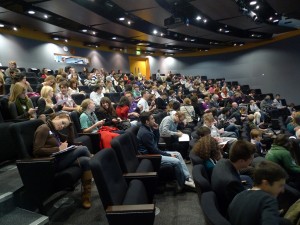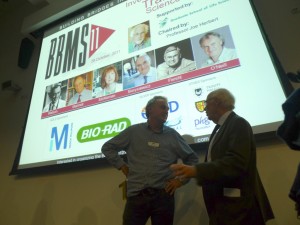MONDAY, 5 DECEMBER 2011
 Translational science involves forging collaborations between different subjects in order to find practical applications in medicine. In times of economic hardship, with funding being cut, many believe it is increasingly important that academic science is seen to be of use in medicine.
Translational science involves forging collaborations between different subjects in order to find practical applications in medicine. In times of economic hardship, with funding being cut, many believe it is increasingly important that academic science is seen to be of use in medicine.Cambridge Vice Chancellor, Professor Sir Borysiewicz, opened the day with an inspiring talk on translational science and the critical role it has in the future of science; how “translation really matters, particularly in healthcare”. He described how medical research has been proven to be the best investment this country can make, and that graduate students and post docs should be invested in, as the future leaders of science.
The next talk switched to a more academic theme, with Professor Sir Alan Fersht speaking about his work on pure, basic science. His lab works on the tumour suppressor protein p53, which is found to be mutated in around 70% of cancer types. The protein is intrinsically unstable, but can be stabilised with a peptide designed by the Fersht lab. He hopes his work will help to pave the way for personalised anti-cancer drugs.
Professor Sir Michael Marmot captivated the audience with an enjoyable talk on his extensive work into the social determinants of health. He explained that there is no good biological reason why there should be a 44-year gap between longest and shortest average lifespan across the world - this is due purely to our social and environmental situations. With some shocking facts, e.g., the bank bailout of $9 trillion being enough to give everyone in the world clean water, he persuaded us that we have the money to improve the environmental and social aspects of many more people’s lives, just not the political will power.
Speaking from a commercial perspective, Vice-president of Pfizer, Professor Ruth McKernan, described the difficulties in bringing new drugs to market, and the efforts of pharmaceutical companies to overcome this. On average, it costs $1.5-2 billion and 17 years to bring a new drug from bench to bedside. Ruth stated that “partnerships [between pharma and academia] are the only way forward” if we are going to see new drugs come to market.
Professor O’Neill of Trinity College Dublin had the audience howling with laughter throughout his talk on examples of collaborative work. This included the work of Watson and Crick crossing the disciplines of physics and biology, as well as his own work on innate immunity and inflammation.
Finally, Dr James Watson, of DNA fame, recounted the tale of solving the structure of DNA. This story has become controversial in recent years, with Rosalind Franklin seen by many to have been robbed of the joint Nobel Prize, a view disputed by Dr Watson. However, the audience obviously enjoyed Dr Watson’s talk, particularly his heartfelt account of Francis Crick.
Feedback from the day included “The variety of symposium topics and their passionate deliveries made for an excellent day.” - Dr Su Metcalfe, and “Some events make you feel very privileged to attend, and this is one of them”- Dr Virginia Clowes.
With planning already underway for next year’s event, BBMS 2012 looks set to become the largest student run conference in Cambridge, with even more scope to attract world class speakers.
Written by Jennifer Warren


